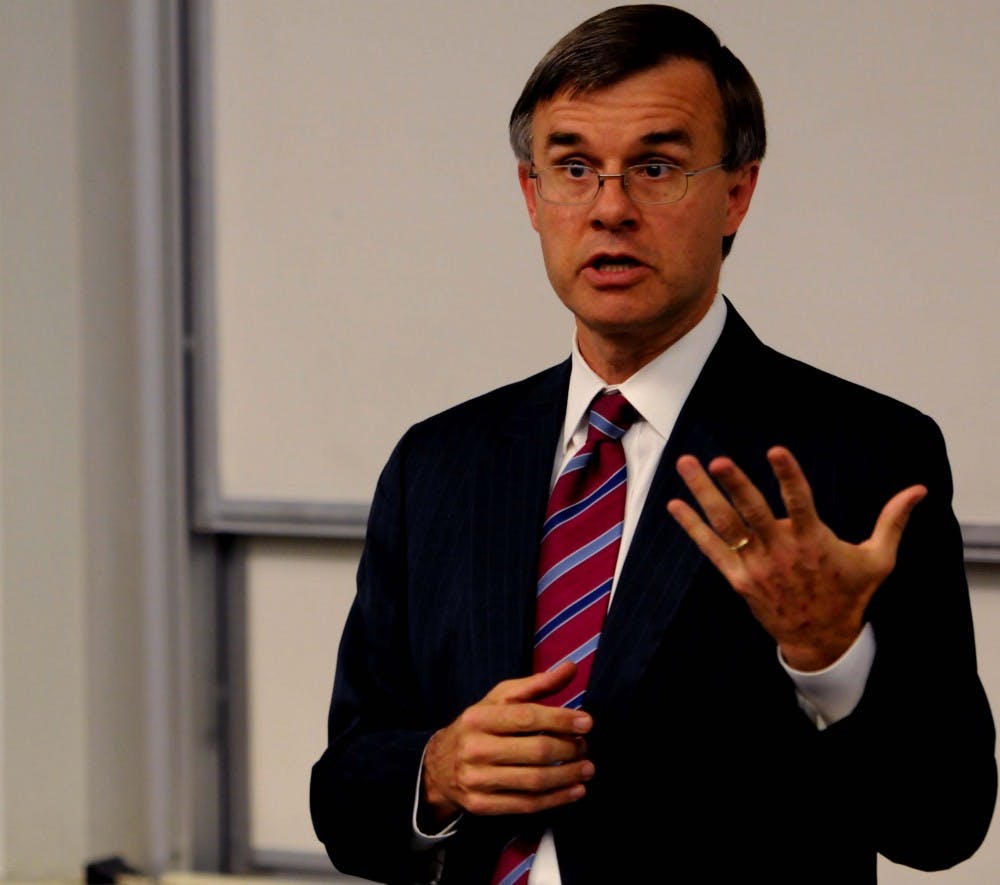
Tuesday night, the Penn Middle East Center, in conjunction with the American Tunisian Association, hosted former United States Ambassador to Tunisia Gordon Gray. Gray was ambassador during the Tunisian Revolution, the powder keg for the Arab Spring, and came to speak about his experiences as a diplomat and Tunisia’s movement towards democracy.
“I was surprised by the degree to which Tunisia really has a Mediterranean orientation,” Gray said, opening the lecture for the roughly 15-person audience. He presented a number of theories on four different factors of the Tunisian Revolution: its speed, its nature, its current situation and its future.
He first gave a timeline of the revolution’s main events, from Mohamed Bouazizi’s self-immolation to dictator Ben Ali’s flight, all the while detailing the various demonstrations that drove the revolution.
“So in a short four weeks — from Friday, Dec. 17 to Friday, Jan. 14, 2011 — 23 years of authoritarian rule were ended like that,” Gray said.
He calls Tunisia the “first postmodern revolution” based on its lack of ideology, grassroots nature, use of social media and aim: the revolutionaries didn’t want power, they “just wanted Ben Ali to leave.”
Gray then discussed Tunisian politics since January 2011, including the electoral reform of the interim prime minister, Beji Caid al Sebsi, and the rejection of Shari’a law, each of which he called a “major political consensus.”
Looking towards the future, Gray said, “I will break the cardinal rule of diplomacy and I will publicly express optimism. I think the Tunisians are capable of transitioning from autocratic rule to a democratic political system.”
Tunisia sports an educated, homogenous, tolerant society, with a large middle class, equal gender rights and some democratic institutions already in place.
Gray is also approving of their willingness to turn outward for help and applauds the United States’ role in their transition. He said, “We can be proud of what we’ve done.”
To hopeful diplomats studying at Penn, Gray, who attended Yale and then Columbia, called his political science studies “fascinating,” but admitted that he didn’t have much use for them in his daily work. “There was a great focus on the Cold War rivalry,” he said. Times have changed, however, and Gray said, “What’s important is knowing your country, so a liberal arts education is probably best.”
Mansour Soussi, a Tunisian-born man in the crowd, was happy with Gray’s talk, especially his discussion of the Salafists, a radical fundamentalist Islamic group in Tunisia.
College freshmen Tony Morales and David Conboy noted that it was a “really cool lecture,” but that it was “under-advertised.” “I only just found out about this from my friend at dinner,” Morales said.
Andrea Calabretta, a Philadelphia-based writer and former Fulbright Scholar who taught in Tunisia, agreed that the lecture was interesting, but that she had “heard a lot of it before.” She also was wary of Gray’s moderate depiction of Ennahda, the Islamic party in control of the interim government. She claims that on the ground in Tunisia, Ennahda is seen as much more conservative and imposing of Islam — a view that Jerry Sorkin, president of the American Tunisian Association, shares.
In the end, Gray gave one sentiment everyone could agree on: “When we look back on the events of 2011, we’re going to say that this was as historic a year for the Middle East as 1989 was for the Soviet Union.”
The Daily Pennsylvanian is an independent, student-run newspaper. Please consider making a donation to support the coverage that shapes the University. Your generosity ensures a future of strong journalism at Penn.
DonatePlease note All comments are eligible for publication in The Daily Pennsylvanian.




